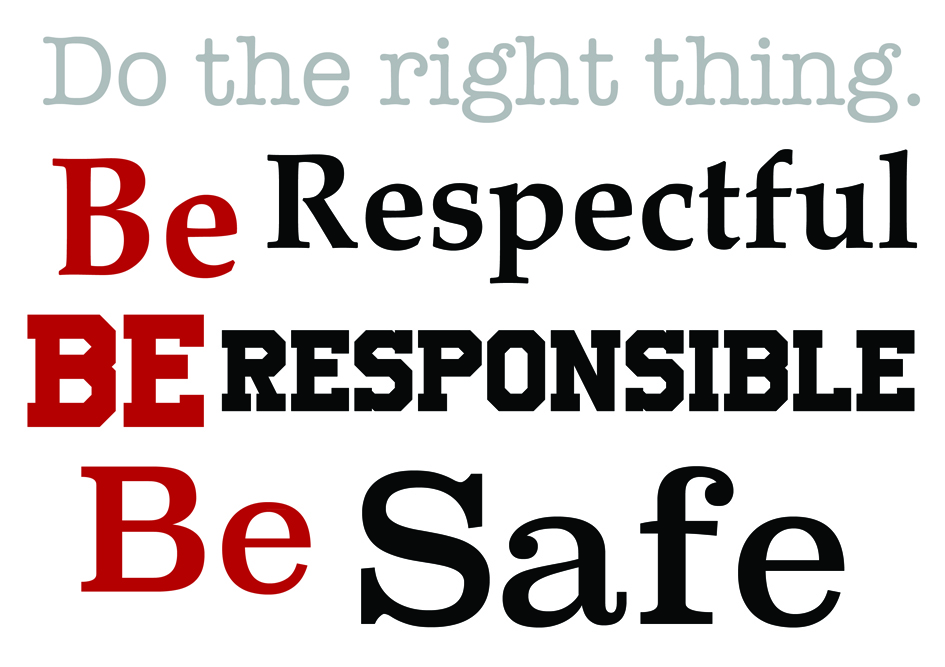The Three Bs
This week our elementary school kicked off our first CommUNITY Week, a week focusing on interpersonal decision-making and kindness. I’ll be sharing what our staff and I have been sharing with the students in this blog so that parents and staff can be on the same page at school and at home. In each of our morning assemblies this week, elementary students have been shouting out the Three Bs. These have also been featured in coloring sheets and on new reflective signs in the washrooms.
Be Respectful. One of my favorite passages in scripture is Romans chapter 12, and midway through this chapter Paul writes, “Outdo one another in showing honor.” What a challenge! At the root of this challenge is the idea of respect. In my experience, the concept of respect is a wonderful way to frame “classroom management,” as it’s called in the educational world. When a student interrupts another student, instead of saying “Don’t interrupt!” it’s much better to ask, “Do you think your classmate feels respected when you interrupt with your own ideas? Would you?” Through this framework, students are seeing how their behavior affects others; they are not just seeing a list of rules.
My first classroom teaching experience was in St. Louis Public Schools, a district known for having student behavioral problems and school violence. It was a tough first go at teaching. My first class of kids felt impossible to manage. But on the second day of school, under the advice of a wonderful mentor teacher, I had my classes create a Compact of Respect, writing out how we wanted (a) students to respect each other, (b) students to respect the teacher, and (c) the teacher to respect the students in our classroom. The transformation wasn’t magical, but it was close! After framing behavior this way, suddenly behavior was about relationships, not rules. Following instructions wasn’t about obeying me, the teacher; it was about getting stuff done together so we could learn something. My class prep wasn’t about doing my job; it was about preparing something interesting for my students because I respected them.
Be Responsible. Jesus once said that “one who is faithful in a very little is also faithful in much.” We have each been given so much, and our students are also incredibly blessed. They have caring parents and teachers, attend an excellent school, and have food on the table. But my hope for our students is that these blessings lead to faithfulness and gratefulness and responsibility rather than selfishness or abuse of privilege. This week our staff are working to help frame decision making through responsibility as well as respect. At lunch today, I had a chat with the first graders about being responsible for a mess on the table, and at soccer practice after school I had a talk with a few second graders about being responsible as team members, putting their soccer balls away as asked so that the team did not have to wait. It’s easy to let irresponsibility go unnoticed or unaddressed, but consistently helping kids see it as a form gratefulness will have great long-term benefits if we keep at it.
Be Safe. This final B is very important in light of the tendency of many elementary students to respond to frustration with physical violence. It’s very common for a third grader, for example, to give a classmate a shove if he takes something from him on the playground. It’s also common for kids to make irrational decisions like kicking a ball into a crowd or jumping off the monkey bars when another kid is below. Discussing these kinds of behaviors in light of safety again makes the conversation one about protection and about helping others rather than about rules. We shouldn’t take that jump off the monkey bars not only because it’s a rule but because it’s a decision that will physically hurt others and also yourself! Being safe also fits with Morrison’s goal of adherence to the Child Safety & Protection Network guidelines.
“Be Respectful! Be Responsible! Be Safe!” isn’t just a catchphrase. Our hope at MAK is to consistently use it as a framework for crucial conversations about decision-making. I encourage parents to use the same framework at home. If your daughter is talking about how stupid another child is in her class, ask: “Is that being respectful? Would you like to be talked about in that way?” If your son is sneaking off to his room to watch youtube videos instead of completing his Chinese homework, or if you daughter is leaving the table without cleaning up her dishes, it might be time to have a talk in the context of personal responsibility. If your children are resorting to violence to ‘solve’ a conflict, it may be best to talk about it in the context of safety.
If the language we use is consistent both at school and at home, I think we will see some breakthroughs in how our kids think about their behavior. Be respectful. Be responsible. Be safe.